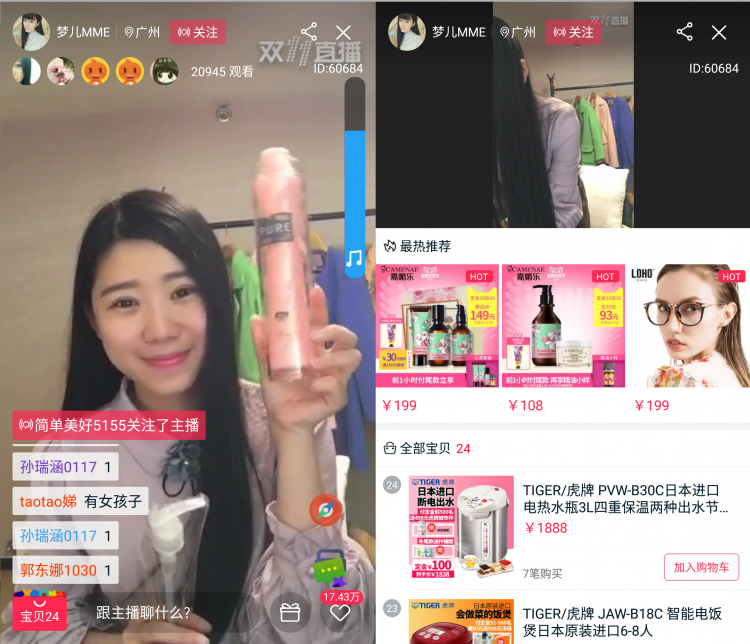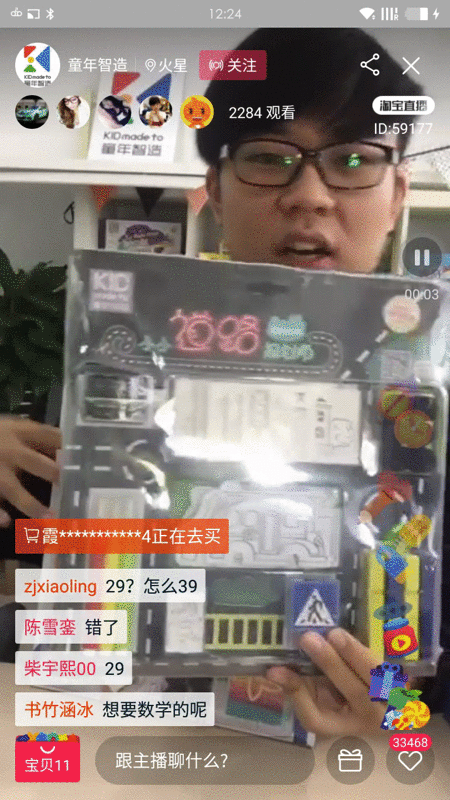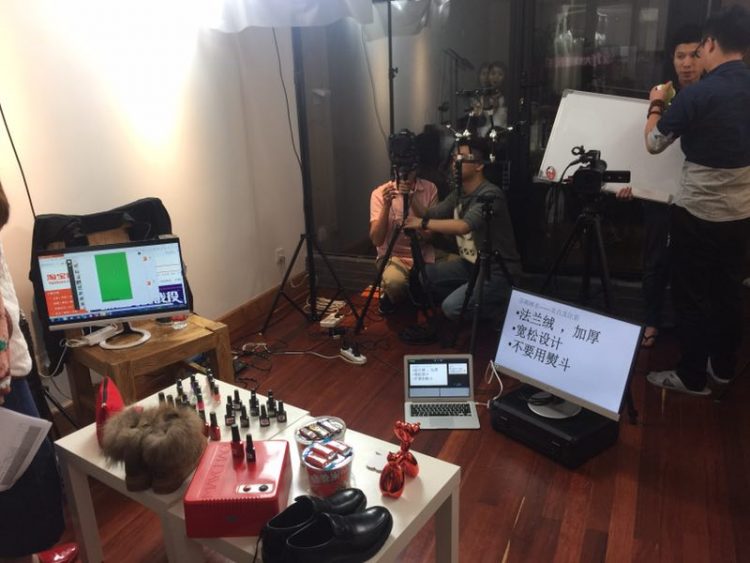
Live TV or live streaming? Photo credit: VS Media.
The woman on camera has something special for us. She holds up a tall, pink bottle of body wash that looks like it was made by Barbie.
“Isn’t it pretty?” she coos. “I think it’s beautiful.”
It’s a Monday afternoon and there are roughly 20,000 people online, watching as the live streaming host showcases the body wash, waxing poetic about its health benefits and how, as women, we need to treat our bodies well. Orange text covers the screen as users add it to their shopping cart. After a brief product Q&A, the woman puts away the bottle and prepares for the next product in the queue: a red rice cooker.
Live streaming isn’t new in China, but it’s certainly early-stage. Earlier this year, live streaming grabbed headlines as scantily clad women pranced and bantered in front of their smartphone cameras, raking in hundreds of thousands of RMB per month in virtual gifts from China’s zhainan or geeks. In May, the Chinese government cracked down on five major live streaming sites, resulting in a flurry of ad hoc rules, such as registering your Chinese ID number in order to create an account, or bizarre point systems to punish plunging V-necks and short shorts. And with over 100 live streaming apps in the country, this new web industry is still fragmented and chaotic.
Still, live streaming content is starting to mature and diversify. There’s gaming, of course, which has been around for years, as well as the ‘showroom’ genre, where aspiring music stars sing along karaoke-style to soundtracks or play their own songs. Now it’s all about shopping.

Clicking the hot pink shopping bag at the bottom shows the live streaming host’s queue of products.
“You can add me on WeChat if you want something,” says ‘Una’, a host on Inke. After demonstrating how to use a face injection mask, she orders her assistant to post her WeChat username into the chat.
According to her WeChat profile, Una is based in Melbourne, Australia and a self-identifying daigou agent, a word that describes China’s gray cross-border ecommerce industry that’s resulted in things like Hong Kong’s baby formula shortage. Her live streams primarily consist of product demos for brand-name cosmetics and beauty products, like face masks and lipstick.
Daigou agents and other freelance hustlers aren’t the only ones taking advantage of live streaming to promote their goods. Given that, according to a report released in June, roughly 46 percent of China’s internet population has used a live streaming app, it’s no surprise that the country’s largest ecommerce platforms, such as Alibaba’s Taobao and arch-rival JD, have jumped on the live streaming craze with their own platforms as well – Taobao Live and JD Live.
Shop owners and brands can produce their own web broadcasts, prompting audience members with notifications that lead straight to the purchasing page. These real-time testimonials and interactive product reviews make for persuasive advertisements. According to Alibaba, the conversion rate of content on Taobao Live is 32 percent – 320,000 items added to cart per one million views.
“What if you don’t have something?” writes one of Una’s audience members in the chat.
Reapplying a fresh layer of red lipstick, Una smiles coyly. “Anything you want, I can get it for you.”

Live advertising
“Live streaming is just like [a] TV station when they do live TV,” Ivy Wong tells Tech in Asia. “It’s like a live entertainment event.”
Ivy is the CEO and founder of VS Media, a network for content creators in Taiwan, Hong Kong, and mainland China. The goal is to cultivate digital entrepreneurs, or people who can monetize good content, whether it’s singing or comedy skits. Content includes short videos, photos, blog posts, Weibo posts, and – live stream shows.
For this year’s Singles Day, China’s largest shopping holiday, VS Media is partnering with Alibaba to release daily live streams on Taobao products. Hosts will vary depending on what’s sold. For baby products, VS Media will find live streaming moms with a large online following.
“It’s actually all planned,” explains Ivy. “It’s essentially a TV program.”
Unlike more casual live streaming shows, broadcasting for brands requires more preparation and polish, says Ivy. For example, VS Media provides its live streamers with a studio, complete with a fake bed. Off set, VS Media has people behind and around the camera, helping hosts interact with their audience members, sometimes on several apps. While the host is dancing, singing, or otherwise occupied, someone from VS Media is carefully reading through different comments, flagging ones that they should respond to. To prompt and communicate with the busy host, paper signs are used.
“If you are dancing and singing at the same time, it’s really hard for you to look at the comments and react,” says Ivy. “You definitely need someone to screen the comment and say now you react.”
Similar to other incubators targeting China’s growing population of internet celebrity wannabes, VS Media also trains its content creators on how to engage with audience members while live. The end goal, of course, is to earn as many virtual gifts as possible. Some techniques include acknowledging old fans that return to their live streaming ‘room’ or greeting newcomers. VS Media has also accumulated tips and tricks from its own creators.
“They will say, oh wow, Uncle A sent me a Ferrari. How about Uncle B, how about Uncle C – are you going to send me a house?” Ivy laughs, referring to some of pricier virtual gifts.

Behind the scenes. Photo credit: VS Media.
In many ways, product-focused or ecommerce live streaming shows are simply a new generation of infomercials. Instead of prepackaged and edited programs, everything is live. Audience members can grill the host, and in turn, the host can dazzle or charm the audience.
For internet celebrities, ecommerce live streaming offers a steadier and often more lucrative source of income than depending solely on the generosity of their audience. Tan Yuanwu, a 34-year-old internet celebrity who blogs about skincare products and cosmetics, says one hour of live streaming for a brand will bring in around US$443 – at least. Another less well-known internet celebrity, Huo Qiu, quoted a minimum of US$295 per hour.
“Because I’m a mom, sometimes they’ll want me to live stream with my kid. Then the price will go up,” Yuanwu explains. “Some clients will have even more requirements. For example, they’ll want you to not wear make up. Or they’ll want you to change your make up live or wear five to six different outfits.” The most she’s ever made was US$2,952 for six hours of live streaming, she says.
Yuanwu started experimenting with different skincare products when she was 12 years old and terrified of getting acne. After graduating from university, she began blogging about skincare products on a women’s health and beauty website called Only Lady. She slowly amassed a following – all while working full-time in the securities industry – which grew even faster after she created her own account on Weibo, China’s answer to Twitter.
Now, she’s working full-time as an internet celebrity so she can be a stay-at-home mom. Projects from clients keep her busy.
“At night, when I go home and pull out my phone, it’s filled with WeChat messages [from clients]. You have to chat with them non-stop,” she says. “Sometimes, your hands are cupped around your phone and your fingers are stiff because you’ve been chatting with people for two hours.”
In general, Yuanwu’s not a fan of live streaming. She doesn’t really get it – she finds most of it incredibly mundane and boring. Many live streaming hosts are just like car models, paid to pose and stay quiet, she says. She prefers to talk about products via recorded video, where she can interact with audience members through comment threads. Simultaneously broadcasting and engaging audience members is distracting.
“Let’s say you’re talking to them about what kind of lipstick you’re wearing,” she says. “They might suddenly ask, hey, what’s that thing behind you?” Unlike some internet celebrities, Yuanwu doesn’t have any help when it comes to content creation, though Only Lady and internet celebrity services like ParkLu occasionally connect her with clients.

Tan Yuanwu. Tattoos and swords edited in by her husband. Photo credit: Tan Yuanwu.
Big-name brands like Lancôme and Elle are just starting to test out the advertising potential of live streaming. In May, Maybelline ran a successful live streaming campaign featuring Chinese celebrity Angelababy on Meipai, selling 10,000 lipsticks in two hours. However, the future of commercial live streaming still needs more hashing out as both companies and internet celebrities figure out how to effectively leverage the technology. In addition, to represent a brand or a company, live streaming hosts who are committed to building a career out of internet fame will have to increase their content quality.
Still, Ivy is optimistic about VS Media and the web’s newest trend. After all, accredited finance institutions like Huachuang Securities and Credit Suisse have pegged live streaming as a multi-billion dollar industry.
She sees particular potential for live streaming in things like travel and shopping. After Singles Day, she wants to start trialing live shopping, where she sends a few internet celebrities to boutiques in Seoul. Audience members will be able to shop with them, but will only have a few minutes to decide on what they want before the live streaming hosts leave the store.
“Live should have an urgency,” Ivy says. “I cannot stay here the whole day, right? Just five minutes. So I will buy, buy, buy for you – just pay.”
Converted from Chinese yuan. Rate: US$1 = RMB 6.77.
This post Live streaming in China moves beyond cleavage and dancing appeared first on Tech in Asia.
from Tech in Asia https://www.techinasia.com/live-streaming-ecommerce
via IFTTT
No comments:
Post a Comment